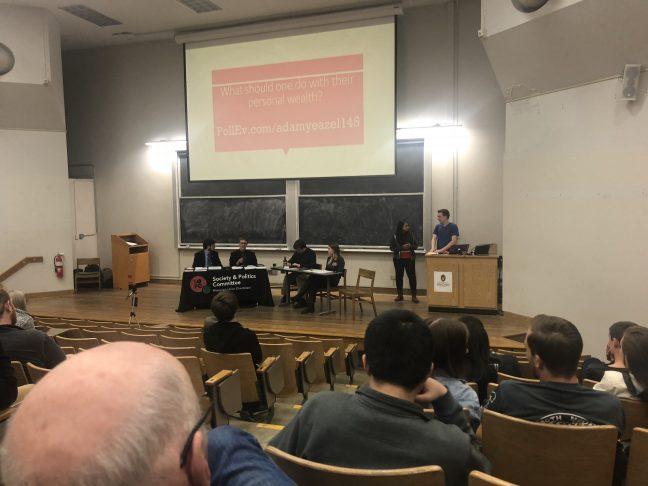University of Wisconsin Atheists, Humanists and Agnostics and Badger Catholic debated the purpose of wealth and where rights are derived from through the differing prisms of Christianity and secularism Wednesday night in their annual debate.
Ben Adams and Melissa Lyman represented AHA and Geoffrey Ludvik and Tom Dobbins represented BC. Wisconsin Union Directorate Society and Politics moderated the debate.
The two sides disagreed on where rights originate. Adams said rights, like property rights or liberty, are purely social constructs and exist on a spectrum based on sentience. A rock, for instance, would not have any rights, but a bug would have certain rights, like the right to a habitat. A human, the being with the most sentience, deserves the most rights and freedom.
Adams posed a hypothetical universe where one human existed and used it to explain how rights do not exist without other people. A lone person does not have the right to bear arms, for instance, because no one is there to protect that right. And a person does not have the right from certain things, like the right from unreasonable searches and seizures, because no one else exists to search or to seize.
“You have no right to protection or education because there’s no one there who could protect you, and there’s nobody there who could educate you either,” Adams said. “You are not being prohibited from doing anything because there’s absolutely no one to do the prohibiting.”
Dobbins, however, argued that people’s rights in society comes from natural law, the idea that certain rights are inherently good or bad. Natural law allows the right to pursue the common good and allows one’s own flourishing.
But Dobbins added the modern world’s increasing number of laws, like property rights, do not override someone else’s natural rights. If a person owned all the land in the U.S., their property rights do not override the rights for others to drink the water from that land and flourish. If a person’s rights are just, a person’s actions should also be just.
“With great power comes great responsibility,” Dobbins said.
The groups also deliberated what one should do with their personal wealth. Both groups ultimately agreed that people should use their wealth to help others, but the two sides came to their conclusions from different paths.
Lyman said as a secular humanist, empathy compels a person to use their wealth to help others and not to let it accumulate.
“The majority of humanists believe that one should give to charity in order to make the world a better place and simply because they care about other people,” Lyman said. “Since secular people do not believe in an afterlife, they ascribe significant value to the life that they are currently living on earth.”
Both Lyman and Ludvik agreed that money should be used as a tool to help others.
Ludvik added that Catholics are compelled to give not just because of inherent empathy, or nature, but because of grace and a unified worldview of prudence, justice, sacrifice and, above all, love.
“Grace elevates and perfects nature,” Ludvik said.
The two groups ended by saying the idea which makes them question their beliefs most. For both Ludvik and Dobbins, the concept of evil was the most compelling argument against the existence of God. For Lyman, the Bible itself most dissuades her from her beliefs, and for Adams, if not for his secularism, the idea of natural rights is most compelling.


